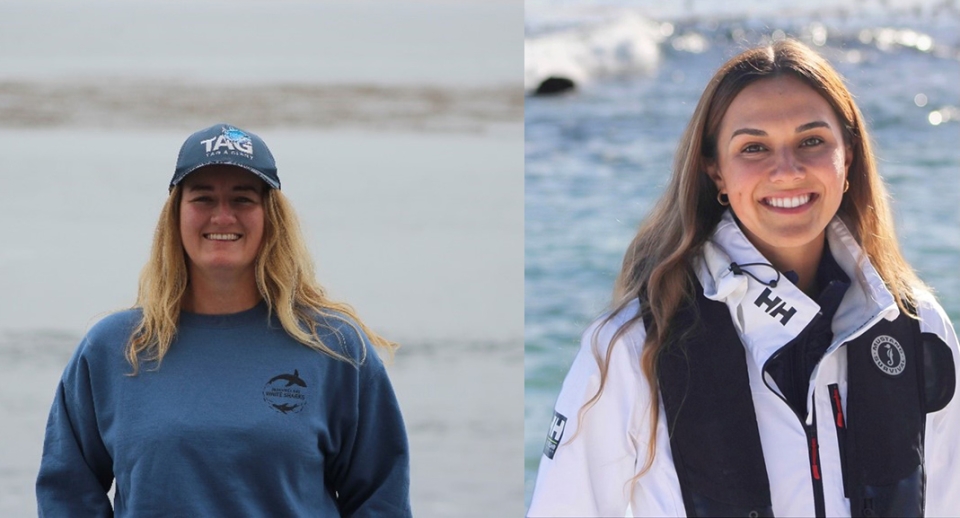Advanced Techniques and Collaborative Efforts in Studying White Sharks in Monterey Bay
–
Morse B105Morse Building
426 Van Buren St
Monterey, CA 93940 View in Campus Map
Free
Open to the Public

This talk will showcase how technological advances are transforming white shark research.
Advanced Techniques and Collaborative Efforts in Studying White Sharks in Monterey Bay
Speakers: Dr Samantha Andrzejaczek, Research Scientist, Stanford University and Alexandra E. DiGiacomo, PhD Candidate, Stanford University
Thursday, September 18, 2025
6:00pm to 7:30pm Pacific Time
In-person event (recorded but not live-streamed)
Morse Building, Room B105
426 Van Buren Street, Monterey, CA 93940
About the Topic
Monterey Bay National Marine Sanctuary serves as a critical habitat for both juvenile and adult white sharks, offering researchers a unique opportunity to study these animals across life stages. Our lab employs cutting-edge approaches to study these apex predators, examining everything from their daily movements and feeding behaviors to their genetics and population structure.This talk will showcase how technological advances are transforming white shark research. We’ll explore how drone (UAS) imagery is revealing unprecedented details about surface behaviors, while sophisticated electronic tags are tracking sharks across vast ocean migrations—painting a picture of how these animals use space from local hunting grounds to transoceanic highways. Beyond the technology, we’ll discuss how collaborative science is amplifying our impact. By partnering with diverse experts throughout the Bay, we’re uncovering the intricate predator-prey relationships that shape this ecosystem while expanding our ability to share these discoveries with the public.
About the Speakers
Dr Samantha Andrzejaczek, Research Scientist, Stanford University
I’m a research scientist at Hopkins Marine Station with a broad interest in the movement and behavioral ecology of sharks and other large pelagic predators. My work combines cutting-edge electronic tagging technology with field research to decode how these predators navigate and behave in ocean environments. I completed my PhD at the University of Western Australia where my thesis investigated the patterns and drivers of vertical movements of sharks and other large epipelagic predatory fishes. Currently, I lead the adult white shark field program in the Block lab, where my research focuses on tracking movement patterns across multiple spatial and temporal scales.
Alexandra E. DiGiacomo, PhD Candidate, Stanford University
I am a PhD candidate in Biology at Stanford University. My dissertation research integrates remote sensing and biologging technology to investigate white shark movement ecology in Monterey Bay. Previously, I received a B.S. in Biology at Duke University and conducted research in Duke’s Marine Robotics and Remote Sensing Laboratory. As a scientist, I am broadly motivated to seek solutions that expand the scale at which we can understand and conserve ocean ecosystems. For this reason, my research works to leverage and develop computational approaches to answer critical biological and ecological questions.
Recommended Reading
- Andrzejaczek S et al. (2025) Seasonal patterns of adult and subadult white shark presence at coastal aggregation sites in central California. Wildlife Research 52, WR24136. doi:10.1071/WR24136
Location: Morse Building, Room B105
The Morse Building is located at 426 Van Buren Street, Monterey, CA, 93940, on the campus of the Middlebury Institute of International Studies. The Morse building usually has flags hanging from it, and is located next to the MIIS Our Green Thumb garden. B105 is located toward the back of the building on the first floor. There is a wheelchair lift in the Holland courtyard, and stairs can be avoided by circling the back of the Holland Center and back to Morse. Restrooms are located in the Holland Center. View the campus map.
Parking
Parking is available in any Middlebury Institute campus lot after 5 p.m., no parking permit required, no fee. View the campus map. (be sure to not confuse city lots with campus lots—city lots do charge a fee). Free parking is also available on the street (time limits on surrounding streets end at 6 p.m.).
About the Host
The Center for the Blue Economy is a research center at the Middlebury Institute of International Studies, that provides economic and policy analysis to support the development of a robust and equitable blue economy for the 21st century. The Center uses the World Bank’s definition of the Blue Economy: the sustainable use of ocean resources for economic growth, improved livelihoods and jobs, and ocean ecosystem health. We must maintain ocean health to maintain human health, economic health, and the health of the planet. Climate change is linked, inextricably, to a healthy ocean. Consider joining our movement for Ocean Climate Action Now. Consider joining our Center for the Blue Economy Newsletter List (3-4x per year by email).
Gratitude to Our Sponsors
We thank the Loker Hicks Foundation and the Nancy Eccles and Homer M. Hayward Family Foundation our sponsors.
Questions
Contact Rachel Christopherson at the Center for the Blue Economy at cbe@miis.edu or (831) 647-4183.
